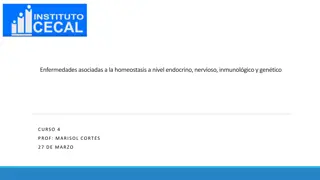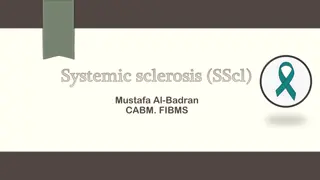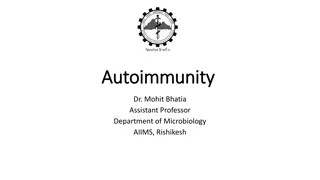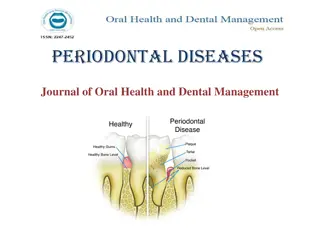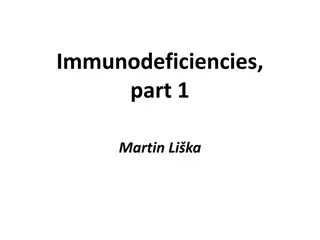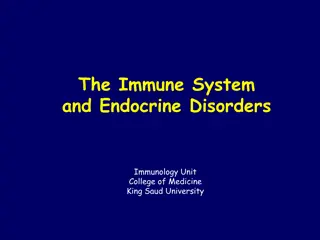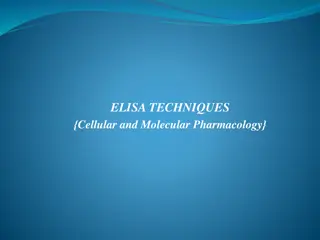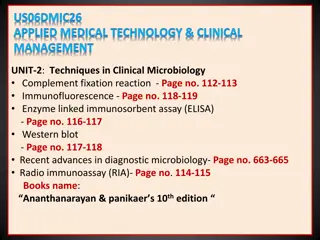Understanding Diseases Associated with Homeostasis in Endocrine, Nervous, Immunological, and Genetic Levels
Exploring diseases related to disruptions in homeostasis at endocrine, nervous, immunological, and genetic levels, focusing on conditions like hormone imbalances and metabolic disorders such as growth hormone deficiency and diabetes. Learn about the impact on health and the body's intricate regulato
5 views • 38 slides
Transplantation Immunology
Learn about histocompatibility systems, alloantigen recognition, graft types, graft rejection mechanisms, graft-versus-host disease risk factors, HLA typing methods, and detecting HLA antibodies in clinical transplantation. Explore hyperacute and acute rejection episodes, their immunological mechani
4 views • 11 slides
Understanding Acquired Immunity and Its Types
Acquired immunity, also known as adaptive immunity, is the resistance developed by an individual to foreign molecules. It involves antigenic specificity, diversity, immunologic memory, and self/non-self recognition. The two main types of acquired immunity are active immunity, developed from antigeni
3 views • 17 slides
Understanding Systemic Sclerosis: Causes, Symptoms, and Management
Systemic sclerosis (SScl) is an autoimmune disorder affecting connective tissue, leading to fibrosis in the skin, internal organs, and vasculature. It is characterized by Raynaud's phenomenon, digital ischemia, sclerodactyly, and cardiac, lung, gut, and renal involvement. Peak onset is in the fourth
1 views • 28 slides
Understanding Rh Isoimmunization in Pregnancy
Rh isoimmunization is an immunological disorder that affects pregnant Rh-negative mothers carrying Rh-positive fetuses. This condition can lead to hemolytic anemia in the fetus. The Rh antigen is limited to the red cell surface, and the transfer of fetal red cells to the maternal circulation can tri
0 views • 25 slides
Understanding Antigen-Antibody Reaction: Agglutination Tests and Coombs' Antiglobulin Test
Learn about the principle and types of agglutination tests, including slide and tube agglutination, used for identifying bacterial isolates and blood grouping. Discover the importance of Coombs' test in detecting incomplete antibodies. Explore the applications and techniques involved in these immuno
2 views • 13 slides
Understanding Antigens and Immunogenicity in Immunology
Learn about antigens, immunogenicity, antigenicity, and epitopes in immunology. Antigens are substances with distinct immunologic properties, while immunogenicity refers to the ability of an antigen to induce an immune response. Antigenicity is the ability of an antigen to combine specifically with
0 views • 41 slides
Understanding Autoimmunity and Immunological Tolerance
Autoimmunity is a condition where the body's immune cells mistakenly attack its own tissues, leading to damage. Immunological tolerance helps prevent this by mechanisms like central and peripheral tolerance. Central tolerance involves deleting self-reactive immune cells during maturation in key orga
1 views • 32 slides
Understanding Complement Fixation Test (CFT) in Immunology
Complement Fixation Test (CFT) is a key immunological method used to detect specific antibodies in a patient's serum by using complement proteins. This test involves the stages of incubation with antigens, inactivated serum, and complement, followed by the indicator stage using sheep red blood cells
1 views • 17 slides
Understanding Periodontal Diseases and Their Management
Periodontal diseases affect the supporting structures of teeth and can be caused by bacterial plaque accumulation and host immunological factors. Types of periodontal diseases include gingivitis, herpetic gingivostomatitis, acute necrotising gingivitis, periodontitis, and aggressive periodontitis. P
0 views • 10 slides
How PluriBead Supports High-Quality Basophil Isolation for Immunological Studies
When it comes to high-quality cell isolation, the right technology can make all the difference. For researchers focused on basophil isolation and related immunological studies, PluriBead offers a cutting-edge solution that simplifies and enhances the
0 views • 11 slides
Understanding Immunodeficiencies: Classification, Frequency, and Types
Basic immunological terms explain the functions of the immune system, including defense against infection, homeostasis, and immunological surveillance. Immunodeficiencies are disorders of the immune system that impair its ability to carry out these functions. They can be classified into humoral, cel
0 views • 39 slides
Understanding the Interplay of the Immune System and Endocrine Disorders
Explore the intricate mechanisms of immunological damage to endocrine glands, focusing on disorders like Graves disease, Hashimoto's thyroiditis, type I diabetes, and Addison's disease. Delve into the association of autoantibodies with pathogenic and diagnostic significance, uncovering the complexit
0 views • 33 slides
Understanding ELISA Techniques in Cellular and Molecular Pharmacology
ELISA (Enzyme-Linked Immunosorbent Assay) is a vital immunological technique used in detecting antigens or antibodies in samples. This article covers the types of ELISA tests, such as Direct, Indirect, and Sandwich, along with the principles and applications of ELISA in diagnosis. The process involv
0 views • 18 slides
Overview of Immunohistochemistry (IHC) in Diagnostic and Research Laboratories
Immunohistochemistry (IHC) is a technique used to detect antigens in tissue sections by utilizing antibodies that bind specifically to target antigens. This method has evolved since the 1930s and plays a vital role in disease diagnosis, drug development, and biological research. IHC combines anatomi
0 views • 19 slides
Clinical Microbiology Techniques: Complement Fixation Test (CFT) in Diagnostic Practice
Complement Fixation Test (CFT) is a key technique in clinical microbiology, utilizing antigen-antibody complexes to fix complement for various immunological reactions. The test involves multiple steps and reagents, with guinea pig serum for complement activation. Standardization is crucial for accur
0 views • 46 slides
